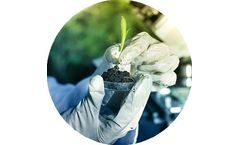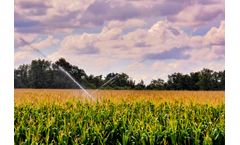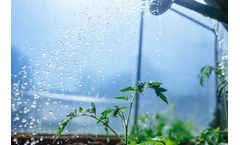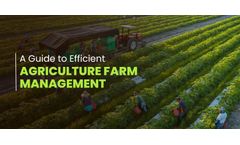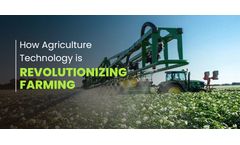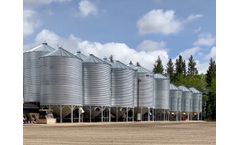Sustainable Use Of Agricultural Articles & Analysis: Older
271 articles found
Increased Food Security Concerns: The necessity to improve agricultural productivity to meet food requirements is prompting the use of agrochemicals. 3. ...
How Does a Biochar Machine Contribute to Sustainable Agriculture? The biochar machine is central to the efficient production of biochar. These machines are designed to process large quantities of organic waste into biochar, offering multiple benefits for agricultural applications. When used as a soil amendment, biochar improves ...
Creative Enzymes is at the forefront of developing specialized enzymatic solutions that enhance feed efficiency, support animal health, and contribute to sustainable agriculture. The Scientific Basis of Enzymes in Feed Enzymes are specialized proteins that act as catalysts in biochemical reactions, facilitating the breakdown of feed components into simpler, ...
Several studies have shown that the activity dynamics of toxins and antimicrobials are closely related to their use in agriculture and animal husbandry. Therefore, innovative delivery methods for toxins and antimicrobials are becoming increasingly important in the agricultural sector. Why Are Liposomes Needed in Agriculture? ...
Biochar is a carbon-rich material produced through the pyrolysis of organic biomass under low oxygen conditions. Common feedstocks include agricultural waste, forestry residues, and even municipal organic waste. Its porous structure and chemical properties make it highly effective for soil improvement and environmental benefits. Agricultural practices in developing countries often face hurdles ...
Japonilure has shown great promise in effectively attracting insects and aiding in agricultural pest management. In this article, we delve into the effectiveness of Japonilure in attracting insects, its potential impact on agricultural pest management, and ongoing research on optimizing its use for various insect species. ...
Field Irrigation Systems are essential in agriculture since they help provide water to plants where rain may be erratic or unavailable. Given the ever-rising population around the globe, food production is on the rise, and thus, there is a need to maximize agricultural production. Therefore, contemporary field irrigation systems have developed as an all-important tool to facilitate crop growth, ...
In this way, the use of biochar from agricultural waste biomass not only contributes to soil health but also actively combats global warming. Waste Management and Circular Economy Using agricultural waste to make biochar presents a sustainable solution to managing biomass waste, transforming it into a valuable ...
Water plays a critical role in agriculture, serving as the lifeblood for crops and soil, and is essential for growing food. However, natural rainfall is often unpredictable, insufficient, or unevenly distributed across regions, making irrigation systems a vital component of modern farming. With effective irrigation, many farmers would be able to produce enough crops to meet both local and global ...
In an era where agriculture is essential for sustaining the global population, it’s crucial to examine the unseen threats that farming practices pose to aquatic ecosystems. While modern farming techniques have significantly boosted food production, they have inadvertently introduced risks that could undermine the very foundations of our aquatic environments. Farming, whether involving ...
The project with the Thuwal Fishermen’s Association is aiming at transforming wild-catch fishermen into sustainable farmers. The project will start with the construction of 20 modern and sustainable marine cages, operated with solar energy and with waste extractors to protect coral reefs. About 50 fishermen will be trained as of December 2021 to work on the new operations. ...
This technological revolution promises to improve efficiency, sustainability, and animal welfare, but it also raises ethical and environmental questions. In this article, we will explore the impact of AI on intensive farming, examining the benefits, challenges, and potential future implications. ...
In today’s fast-paced world of greenhouse cultivation, the relevance of a dependable water system to this sector cannot be understated. Regarding plant life, there is a critical need for water. In a controlled greenhouse environment, an appropriate water system can spell all the difference between harvest glory and disappointing harvests. With the puroxi water treatment from puroxi TM Pure ...
Agriculture has always been a fundamental part of human civilization, providing the food and resources necessary for survival. However, as the global population continues to rise and climate change presents new challenges, the need for efficient agriculture farm management has become increasingly critical. Implementing modern technologies and innovative practices can help optimize productivity, ...
Precision agriculture is a revolutionary approach that leverages technology to optimize farming practices. Precision agriculture systems offer a modern solution to these age-old problems, enabling farms to enhance productivity, reduce waste, and improve sustainability. ...
Introduction of Cytokinin Cytokinin is an organic compound that belongs to the cytokinin family. It is widely used in plant physiology and agriculture due to its beneficial effects on plant growth and yield. ...
As global awareness of environmental issues continues to rise, the demand for sustainable waste management solutions is more pressing than ever. In recent years, the push for sustainable practices has brought composting to the forefront of waste management solutions. Composting, the process of decomposing food waste into nutrient-rich soil, has traditionally been a slow, labor-intensive ...
The agricultural sector is at a critical stage. With the global population projected to reach nearly 10 billion by 2050, the demand for food is increasing rampantly. At the same time, there is mounting pressure to adopt sustainable farming practices to protect our planet’s limited resources. This delicate balance between increasing food production and minimizing environmental impact ...
Introduction to Fuel Management Fuel is a critical component in farm operations, essential for powering the vast array of machinery required in modern agriculture, from tractors and combines to pumps and generators. Advanced cloud-based fuel management systems serve as an integral tool for farmers by providing real-time data on fuel usage / levels, which helps in making informed decisions that ...
The evolution of bin management systems has been marked by continuous innovation aimed at improving the efficiency, reliability, and profitability of farming operations. Traditional methods, which largely depended on manual labor for monitoring and managing stored grain, have gradually given way to more sophisticated, technology-driven solutions. These advancements, including automation, are ...

